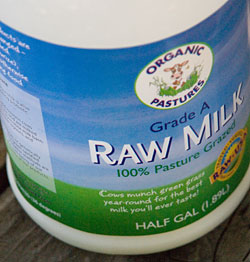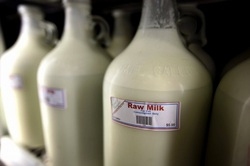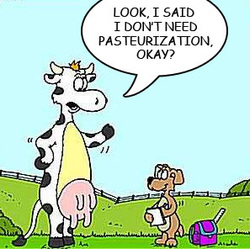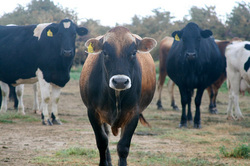Topic discussion...
All I can say is Erica Zolinas is an awesome person. She knows how to edit video clips and is willing to teach me. She is a kick-ass journlist too. I am so lucky of having the pleasure to work with her because honestly, I don't think I could have handled this project by myself. We learned a lot about raw milk since our interviews. We have all the audio under our oral history tab. The audio was a pain especially after the mis-hap of losing it all from the skype interview. After all this research on raw milk, I want to try it.

A doctor wrote this article all about raw milk.
http://www.realmilk.com/raw.html

Check out this article...since raw milk is illegal...
This is your new blog post. Click here and start typing, or drag in elements from the top bar.
This is your new blog post. Click here and start typing, or drag in elements from the top bar.


Erica and I conducted our second interview on Friday via Skype. Our interviewee was a dietician and was very useful for us. She said that she does drink raw milk and that it does have health benefits. We got some really great quotes from her. After the interview we played back the audio. We have to do some editing because there was some buzzing from the speakers.
Bring extra batteries
keep checking to see if recording is working
skype is an awesome tool
flip cams can be really useful
always take notes JUST IN CASE!
have strong editing skills
have extra materials
bring extra pencils and pens
I like the example the writer gives about being influenced by what others say on page 3. I think we all have been there. The awkwardness of entering in on a conversation that started before you arrived. If you speak to soon people would just look at you like "what are you doing here?" If you speak to late or not at all, you will be left out. The example I liked was when you see a friend at a party with a small group, you can pick up on bits and pieces and figure out what everyone is talking about. Due to the fact that it is a friend, you should be in good shape not to feel out of place. If you pick up on what they are saying, you can chime in with your thoughts. Also if you are telling it to other peers the story will be a lot different than when you tell it around professors who also at the party. You are actively involved in the conversation with peers, but this conversation at the party is pretty confusing because you have no idea what your friend is talking about. "What changes I should Make?" is also intresting. Being in college most professors let you pick your group. They figure you are all adults you pick your groups. Unless a professor is trying to make a point, they will let you pick your groups. The one thing I don't like about group work, is that I want to earn my own grade. I do not want to receive the same grade as a person who did not at all participate. I want to earn my grade. While working in a group, you have to assign rolls. The leader-takes phone numbers, email addresses, work schedules...etc. A note taker, a joker, a helper to the leader. You all assume rolls according to personality. You just have to hope the joker doesn't take you to far off task. You all do your individual work and your group will be successful. I think we have to ask. "Why do professors put us in groups?" I guess we could argue the fact that they want us to be able to work in the ever so famous learning community. They want us to be able to work coopertavily with others. Especially at Rowan, the way a lot of the classrooms are set up, is not an effective way to work collabrativly. I think they should have tables that can be easily moved. The classrooms need to be bigger and maybe a seprate computer lab that you can go to. Once you have your group, divide the tasks fairly, work on them individually, then come together and conclude the project.
When I first starting reading this I immediatley thought of the Atkins Diet. My mom tried this diet before and then she realized she loved carbs to much to give it up. I also do not understand how people who eat so unhealthy (like France as the reading states) are slimmer than us. I mean America is the probably the "fattest" country. Is it because of the fast food industry? Even if it is, don't all countries have McDonalds? On page 4 of the reading, the writer talks about something that is more than true. We are drawn to foods that are sweet. We assume that we are going to like it because it is sweet. Foods that are bitter are going to turn us away because we feel as though they may "infect" us. I think this is why parents have to start their kids off at a young age eating healthy. If kids are predisposed to healthy food at a young age, maybe they will always eat healthy. The second part of the reading is about corn, buying and selling, and the "plague of cheap corn." It's ashame that the farmers are struggling. Since corn is so cheap they are the ones suffering. You would think that since agrilculture is so important, that the farmers would make out okay.
Erica and I conducted one of our interviews on Tuesday. We knew nothing about the topic until we started talking to her friend's mom. We learned a lot of things about raw milk that some people do not know. We also learned that it is illegal in New Jersey. Raw milk has a golden color to it because of the nutrueits in it. It also has a lot of health benefits. Our interviewee's kids had a lot of health issues when they were babies and then they started drinking raw milk and it was if their ear infections were cured. So we asked her why she thinks its banned in New Jersey. It mostly has to do with the pasterazation process. There are 29 states where it is illegal. It just seems wrong since it seems like it has a lot of health benefits. I would think they would want to make this available to everyone. Raw milk in retail stores cost about the same as a regular gallon of milk. Our interviewee says she hasn't bought regualar milk for so long that she doesn't remember how much it costs. She told us what raw milk costs and it is about the same.
I would like to mention the three terms first. Schneider describes what these three terms mean on page 7 of the reading. Good food is tasty, clean food is sustainable and helps perserve the enviornment, and fair food is produced in socially sustainable ways while focusing on fair wages. I like that he explained these terms. When you read the title you want to know what he is going to talk about. I think we all knew what he meant by good food, but what is fair food? I think it is good that he explained it. I really enjoyed this quote on page 398, "As you might expect from this crowd and this occasion, the talk at the table was mainly about food. Yet this was not the usual food talk you hear nowadays; less about recipes and restaurants, it revolved around specific plants and animals and fungi, and the places where they lived." I think this quote is really important to the reading because a lot of people talk about restaruants and recipes and not enough about where the food actually comes from. It is important to know where your food comes from, so that you might be able to reproduce it or if you get sick you know why.
These are the questions Erica and I are going to be using as a guideline. With this interview as well as someone in the student health center we will be able to have a strong understanding on where to go with our research project.
Why is raw milk illegal?
Is it healthier than other milk?
Is it expensive?
Is it only illegal in NJ or are there other states that it is banned?
How did your family decide to drink raw milk?
Is there any unhealthy factors?
What is in raw milk?




